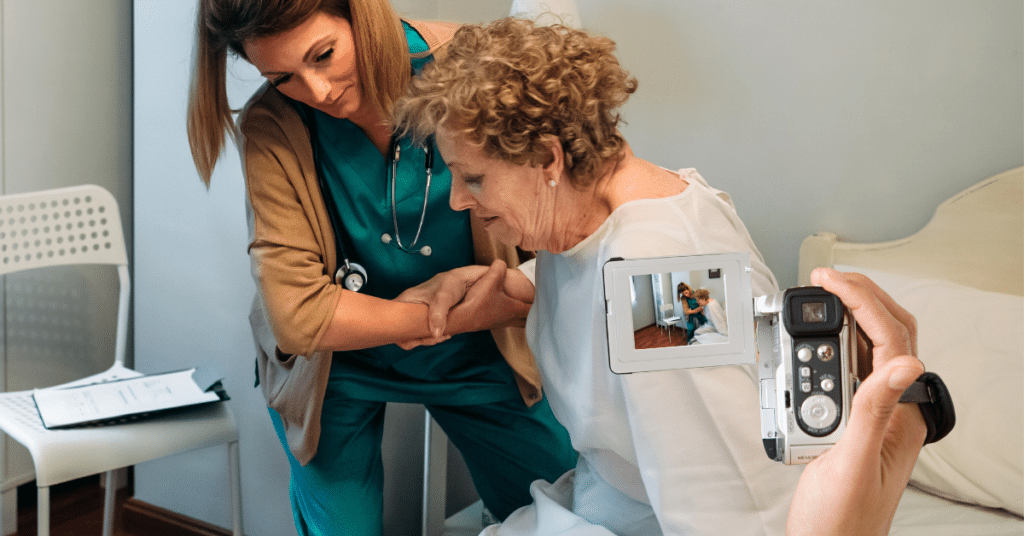
What to Do If a Patient or Their Family Tries to Record You
The prevalence of patients and their families recording nurses during medical interactions has increased with the widespread adoption of smartphones. With smartphones, patients can capture and share their experiences within healthcare settings, including medical conversations, procedures, and interactions with healthcare professionals. However, this practice raises ethical and privacy concerns within healthcare environments.
Why do patients or their family members choose to record nurses?
Patients or their family members might choose to record nurses for a variety of reasons:
- To have a record of interactions, especially if they suspect negligence or malpractice.
- To revisit the instructions or information given by the nurse, ensuring they understand and follow medical advice correctly.
- To ensure that healthcare providers are held accountable for their actions and the information they provide.
- Patients may be overwhelmed with information and use recordings to remember specifics later.
- To share the information with other family members who may not be present at the time of the interaction.
- To have evidence in case of disputes or disagreements about the care provided.
Can a patient legally record a nurse while they’re working?
Recording a nurse during their duties is subject to state laws. In certain states, only one party needs to consent to the recording, allowing either the patient or a family member to record without the other’s knowledge. In contrast, states like California, Connecticut, Delaware, Florida, Maryland, Massachusetts, Michigan, Montana, Nevada, New Hampshire, Pennsylvania, Vermont, and Washington State require consent from both parties as of 2023. Before recording, familiarize yourself with your state’s laws to avoid legal issues.
Even if you live in a state where it is legal to record the conversation, it is important to consider the potential impact on the nurse-patient relationship and whether it could negatively impact the quality of care provided.
What can I do if a patient records me without my consent?
If a patient or one of their family members records you while you’re working, there are several things you can do as a nurse:
- Address the situation immediately and politely ask the patient if they are recording and express your concerns.
- Try to understand the motivation behind the recording.
- Maintain professionalism and set boundaries.
- In difficult situations with patients or family, notify the charge nurse or supervisor as soon as possible.
- Understand both your rights and the patient’s rights. Familiarize yourself with your institution’s privacy policies, state laws on recording, and potential HIPAA implications.
- Keep a record in the patient’s chart or through an incident report to ensure documentation of any unauthorized recordings.
- Look up your organization’s policy on recording in a hospital setting.
- Consult with your hospital or clinic’s legal team or administration for advice on the next steps.
- Regularly update yourself on best practices and legal requirements surrounding recordings in a healthcare setting to protect both yourself and your patients.
- Promote an environment where patients feel they can openly discuss their concerns or reasons for wanting to record, which might reduce covert recordings.
Can covert recordings by patients be admitted as evidence?
Yes, covert recordings by patients or their family members can be admitted as evidence. In one-party jurisdictions, only one party to a conversation needs to consent to the recording for it to be legal. The admissibility of these recordings in court varies by jurisdiction and the location of the recording, with fewer restrictions in public places compared to private settings like hospital rooms. However, the accuracy and completeness of the recording can be challenged.
With the widespread use of smartphones and readily available recording apps, recordings in healthcare settings have become increasingly common. This highlights the importance of clear communication and understanding between patients and healthcare providers. If a patient or their family starts recording you, stay composed and professional. Address the situation promptly by inquiring about their intentions and concerns. It’s essential to be aware of your institution’s policies and the local laws regarding recordings. Above all, prioritize patient privacy, maintain trust, and always communicate clearly. By understanding and addressing the reasons for recording, you can foster a more collaborative and transparent healthcare experience.

Share This Article
Similar Blogs
The Role of Staffing Agencies in Addressing the Nursing Shortage
The nursing shortage has become a critical challenge for healthcare facilities across the United States, putting immense pressure on patient care and healthcare delivery. Staffing agencies like TheraEx…
Posted: 2 Days Ago
Mental Health for Healthcare Professionals During the Holiday Season
The holiday season can be a challenging time for healthcare professionals. While many people enjoy celebrations and time off, healthcare workers often face increased workloads, holiday shifts, and…
Posted: 2 Days Ago
Holiday Travel Tips for Healthcare Workers
The holiday season is a magical time of year, but for healthcare workers, balancing work responsibilities with holiday travel can be a challenge. With demanding schedules, unexpected shifts,…
Posted: 2 Days Ago


